-The Rationale for China's Human Rights Development
China Foundation for Human Rights Development
New China Research, Xinhua News Agency
DECEMBER 2022
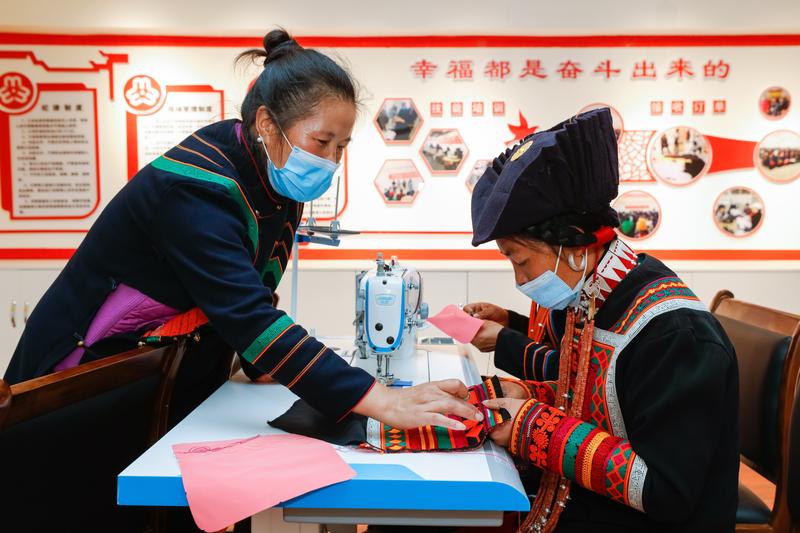 Women learn Yi-style embroidery at a workshop in October in Zhaojue county, Liangshan Yi autonomous prefecture, Southwest China's Sichuan province. (SHEN BOHAN / XINHUA)
Women learn Yi-style embroidery at a workshop in October in Zhaojue county, Liangshan Yi autonomous prefecture, Southwest China's Sichuan province. (SHEN BOHAN / XINHUA)
Contents
Introduction
I. The Basics: Rights to Subsistence, Development, Dignity and Happiness
1.1 Removing the "biggest obstacle to human rights" for 1.4 billion people
1.2 Promoting "holistic human rights" in a coordinated way
1.3 Promoting high standards of "equal human rights"
1.4 Fully participating in global human rights governance
II. The Rationale: Living a Life of Contentment is the Ultimate Human Right
2.1 The core philosophy, the principle of democracy, and the focus on people's livelihoods
2.2 The theoretical rationale
2.3 The objective, law-based governance, and the evaluation criteria
2.4 Global vision
III. Exploring New Dimensions in Respecting, Protecting Human Rights
— Determined Leadership
— Down-to-Earth Approach
— Development-Oriented
— Legal Guidance
— Open-Mindedness
Conclusion
Introduction
It is a great dream of the human society that every one can enjoy human rights in the full sense of the term.
Given the diversity of civilizations, each country is unique with its own history, culture and institutions, as well as its particular development level and path. But promoting and protecting human rights has been a common pursuit of the entire international community.
The emphasis on human dignity and values and the people-centered philosophy is deeply rooted in traditional Chinese virtues, and has been followed throughout China's human rights progress. According to Confucianism, the philosophy with the greatest influence on the Chinese people, "a benevolent person loves others," treats people sincerely and kindly, and upholds human dignity with compassion. When "the widowed, lonely, disabled and ill can all be cared for," and people deal with interpersonal and social relations harmoniously and genially, the society will embrace good fortune and people will be united for a common cause.
The Universal Declaration of Human Rights is the crystallization of such lofty aspirations of mankind. All human beings, so reads the first article, are "endowed with reason and conscience." The addition of "conscience" to this article is the embodiment of the concept of benevolence cherished by Chinese Confucianism. The phrase contains a strong "Chinese conscience," and is saturated with oriental wisdom between the lines.
In the practice of promoting human rights progress, China has followed a path of human rights development that conforms to the trend of the times and suits its national conditions, by combining the Marxist outlook on human rights with the country's actual conditions and the fine traditional Chinese culture, while drawing on outstanding achievements of other civilizations.
A staunch defender of human rights, the Communist Party of China (CPC) has since its founding united and led the Chinese people of all ethnic groups in making unremitting efforts to fight for, respect, protect and develop human rights. It is under the leadership of the Party that China's human rights cause has achieved all-round development, made historic achievements, and created a miracle of rapid economic development and long-term social stability that has rarely been seen in world history.
China's outlook on human rights has been continuously enriched and improved in practice, with its own cognitive perspective and ideological connotation based on the actual conditions of the country. China is committed to protecting and promoting human rights in development, and follows the "development-based approach to human rights." Hunger that once threatened the lives of hundreds of millions of people has made China keenly aware that poverty is the biggest obstacle to the realization of human rights, and that the rights to subsistence and development are the primary basic human rights. Colonial aggression against China following the Opium War has led the nation to fully understand that it is impossible to talk about human rights without sovereignty, and difficult to safeguard certain individuals' human rights without protecting collective rights.
Human rights have historical, specific and practical contexts, and there are no fixed standards or identical models for its development and protection. The path of human rights development in each country should be respected, and the human rights conditions of that country should be judged by its own people. Based on the human rights philosophy that centers on the people, China has proposed that "living a life of contentment is the ultimate human right."
As pointed out in the report to 20th CPC National Congress: This country is its people; the people are the country. As the Communist Party of China has led the people in fighting to establish and develop the People's Republic, it has really been fighting for their support. Bringing benefit to the people is the fundamental principle of governance. Working for the people's wellbeing is an essential part of the Party's commitment to serving the public good and exercising governance for the people. We must ensure and improve the people's wellbeing in the course of pursuing development and encourage everyone to work hard together to meet the people's aspirations for a better life.
We must strive to realize, safeguard, and advance the fundamental interests of all our people. To this end, we must do everything within our capacity to resolve the most practical problems that are of the greatest and most direct concern to the people. We will stay engaged with our people and their communities, adopt more measures that deliver real benefits to the people and win their approval, and work hard to resolve the pressing difficulties and problems that concern them most. We will improve the basic public services system to raise public service standards and make public services more balanced and accessible, so as to achieve solid progress in promoting common prosperity.
The journey of China's human rights development is both rich and colorful, systematic and pragmatic. The country has formed a contemporary Chinese outlook on human rights with "people" as the center, "development" as the driving force and "a life of contentment" as the goal through continuous progress, and has enriched the global human rights cause.
Chapter I
The Basics: Rights to Subsistence, Development, Dignity and Happiness
The Communist Party of China and the Chinese government have included respecting and protecting human rights as a key part of national governance, and thanks to this, China's human rights cause has delivered historic achievement.
"In the past, many people lived their whole lives without a single good day." Chu Chengming, an elderly farmer living in the Dabie Mountains, said emotionally as he browsed through his family tree.
According to the genealogical records, his grandfather raised 10 children, of whom five died young. His father was born shortly after Aisin-Gioro Puyi, the last emperor of the Qing Dynasty (1644-1911), ascended the throne, and died in the War of Resistance Against Japanese Aggression in 1944 at the age of just 36. His mother died at 47.
The record of this ordinary family is the epitome of modern China's reality — people suffering from war, poverty and diseases, with no protection whatsoever for human rights. When the People's Republic of China was founded in 1949, the average life expectancy in the country was less than 35 years old.
In today's China, the lack of food, clothing and medical services is long gone. Since the beginning of the reform and opening up drive more than 40 years ago, the per capita disposable income in China has increased by more than 180 times. Some 770 million rural Chinese have been lifted out of poverty and live a moderately prosperous life. The average life expectancy has risen to 78.2 years. [State Council Information Office: White paper titled "China's Epic Journey from Poverty to Prosperity," September 2021]
Under the leadership of the CPC, the fate of countless people has been changed. A new chapter has been written in the history of China's human rights by the earth-shaking changes in the Chinese society, and the country has seen achievement in the human rights cause on all fronts. China deems the rights to subsistence and development as the primary basic human rights. The CPC is an active promoter and staunch defender of the human rights cause, and has always included respecting and protecting human rights as a key part of national governance. The country has formulated and implemented national human rights action plans and other special plans, to promote human rights development through protection, and to advance the human rights cause through development. It made step-by-step achievements of raising the living standards of its people from poverty to bare subsistence, from moderate prosperity in general to moderate prosperity in all aspects. The country has embarked on a journey of pursuing a higher goal of common prosperity, and is committed to providing a happy and dignified life for some one fifth of the world's population.
1.1 Removing the "biggest obstacle to human rights" for 1.4 billion people
Mass poverty on an enormous scale was once the biggest obstacle in China's human rights cause. Before the launch of reform and opening up, nearly 800 million people were impoverished, unable to meet their basic living needs.
By 2012, there were still 98.99 million people living in poverty in China. China made a nationwide effort to promote "targeted poverty alleviation," so that the remaining poor population could access sufficient food and clothing, while their other basic human rights such as compulsory education, basic medical care and housing security, were also promoted and protected.
By the end of 2020, after more than 30 years of fighting poverty, the largest and strongest such campaign in human history, China had lifted over 770 million rural poor out of poverty.[State Council Information Office: White paper titled "Poverty Alleviation: China's Experience and Contribution," April 2021.] The country met the poverty eradication target of the 2030 Agenda for Sustainable Development 10 years ahead of schedule. With the highest number of people lifted out of poverty, China has contributed to over 70 percent of global poverty reduction.
From being regarded as "a talking tool" to becoming "a person with dignity," 80-year-old Losang Droma from the Khesum Community in the city of Shannan, Tibet Autonomous Region, has witnessed profound life changes: before the abolition of serfdom in 1959, she worked in the slave owner's manor all year round without any income, and she was not treated as a person of dignity. Now, together with all Chinese people, she is living a moderately prosperous life. While enjoying her retirement, she said, "only those who live well and happily can have dignity."
1.2 Promoting "holistic human rights" in a coordinated way
Every kind of human rights is interrelated and mutually reinforcing. By safeguarding people's rights to subsistence and development and promoting the comprehensive and coordinated development of economic, social and cultural rights as well as the civil and political rights of its citizens, China has advanced the cause of human rights with a holistic approach.
It is China's consistent value to put the people and their lives first and to protect people's right to life and health. Since the outbreak of COVID-19 in 2020, China has spared no effort to save every infected patient. From a 30-hour-old baby to the elderly of over 100 years old, every life has been protected with the utmost effort. In the face of the constantly mutating virus, China has carried out scientific prevention and control of the epidemic based on its own national conditions, constantly adjusted prevention and control measures in response to the changing situation, effectively coordinated epidemic prevention and control with economic and social development, and protected people's lives and health to the greatest extent.
The effective protection of economic, social and cultural rights such as the right to education, work and social security has changed the fortunes of countless Chinese people. In 1975, Yang Desen, then aged 18, was working in a small village 200 kilometers from his home. Two years later, he took the college entrance examination and is now a member of the Chinese Academy of Engineering and a well-known underwater acoustic scientist. Yang Desen is just one of millions of examples of people changing their lives through education.
Women and children are key groups in the protection of human rights. The Marriage Law, the first piece of legislation promulgated by the People's Republic of China, explicitly abolished arranged marriage and enshrined freedom of marriage and gender equality. Women's rights are strictly protected in China. The average life expectancy of Chinese women currently exceeds 80 years, while women account for more than half of higher education students and take up over 40 percent of the jobs in the country. In the city of Lijiang in Yunnan Province, Zhang Guimei, who runs the Huaping Senior High School for Girls, has helped more than 1,800 rural girls over the past ten years to realize their college dreams.
Based on its own national conditions, China has constantly developed its whole-process people's democracy, and improved the system of institutions through which the people exercise their role as masters of the country. The country established the system of people's congresses, the system of CPC-led multiparty cooperation and political consultation, the system of regional ethnic autonomy and the system of community-level self-governance, laying a solid institutional foundation for the people to enjoy broader, fuller and more comprehensive democratic rights.
China now has 492,000 villagers' committees and 116,000 residents' committees, covering all residents in both urban and rural areas. In the latest elections for grassroots self-governing organizations completed in 2021, hundreds of millions of people voted and elected nearly 2.8 million members of the committees of local villagers and residents. Gao Jianzhong, head of the villager's committee of Guojiahuochang Village in Yulin city, Shaanxi Province, said the extent of how much people now cherish democratic rights was beyond imagination. "Many villagers came back from hundreds of kilometers away to cast their solemn votes."
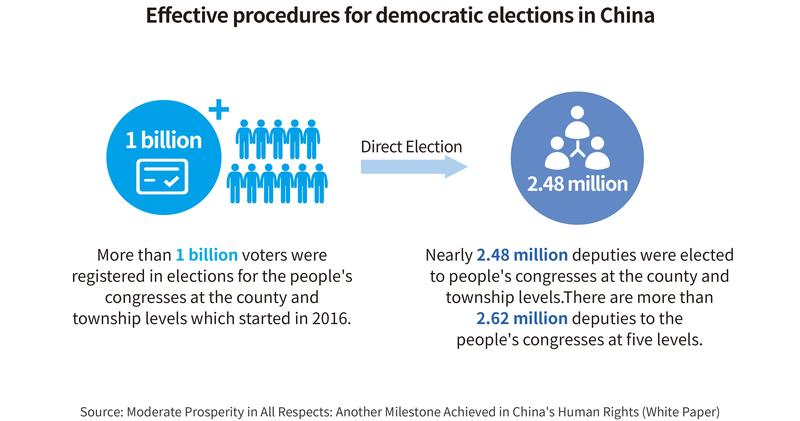
China has also promoted legal protection for human rights and safeguarded social equity and justice. It has formulated and improved a series of legal systems to protect human rights, strengthened law-based governance, sped up the building of a law-based government that the people are satisfied with, deepened reform of the judicial system, fully implemented the judicial responsibility system, resolutely redressed and prevented wrongful convictions and false charges, enhanced people's awareness of the need to respect, study and abide by the law and their ability to apply the law, and striven to respect and protect human rights in the whole process of legislation, law enforcement, administration of justice and observance of the law. From 2016 to 2020, courts across the country retried 8,310 criminal cases in accordance with trial supervision procedures, and overthrew the original judgments.[State Council Information Office: Briefing on the Implementation Results of the National Human Rights Action Plan of China (2016-2020), May 31, 2021]
With the development of the economy and society and the progress of science and technology, the content of human rights has been constantly enriched. The right to privacy was clearly defined in China's first Civil Code, which took effect in 2021. China also promulgated the Law on Protection of Personal Information, which effectively guarantees citizens' privacy. In addition, China has promulgated the Cybersecurity Law and other laws to restrict the collection of consumers' personal information by mobile apps, effectively safeguarding citizens' legitimate rights and interests in cyberspace.
The Human Development Index (HDI), created by the United Nations Development Programme by integrating basic indicators such as life expectancy, education level and quality of life, is a credible proof of human rights progress. Thanks to the improvement of "holistic human rights," China's HDI rose from 0.499 in 1990 to 0.761 in 2019, ascending from the ranks of countries with low HDI scores to the ranks of those with high HDI scores.
1.3 Promoting high standards of "equal human rights"
Although China has finished building a moderately prosperous society in all respects and become the world's second-largest economy, "unbalanced and inadequate" development is still a salient challenge the country faces. In the pursuit of fairer and more comprehensive protection of human rights, China upholds the "bottom-line guarantee" of ensuring basic living standards, and at the same time pursues the "high-line goal" of common prosperity, striving to strike a balance between fairness and efficiency in economic development.
China has built the world's largest social security network, which covers nearly all aspects of people's daily lives. It is a system for ensuring people's well-being that can provide inclusive public services, meet essential needs and ensure basic living standards. "We've got medical insurance, and we have pension after turning 60," said Li Dongfang, a farmer whose family has lived on the banks of the Yellow River on the Loess Plateau for generations.
China's protection of human rights is not just paying lip service, but implemented through concrete actions. By alleviating poverty, renovating dilapidated houses, constructing roads and bridges, and building drinking water projects, China has effectively improved people's living standards. Take environmental rights, which are crucial to the survival and health of its people, as another example. China upholds the basic national policy of environmental protection, follows the path of sustainable development, and includes the right to the environment in its national human rights action plan. In the 10 years since 2012, China's forest area has increased from 208 million hectares to 223.6 million hectares, ranking first in the world in planted forest area.
China's ongoing practice of common prosperity is the pursuit of a higher level of human rights protection, which will further improve people's lives, narrow the gap between the rich and the poor, and enable all people to share the benefits of development.
1.4 Fully participating in global human rights governance
While advancing its human rights cause at home, China also actively fulfills its responsibilities as a big country, by vigorously promoting the common values of peace, development, fairness, justice, democracy and freedom, by engaging deeply in UN human rights affairs, and by extensively carrying out international human rights cooperation, thus continuously promoting global human rights governance and effectively promoting international human rights development and progress.
China has successively ratified or acceded to more than 30 international human rights instruments, including six core UN conventions. It has provided assistance to 166 countries and international organization, and sent over 600,000 people on aid missions. It has also canceled matured government interest-free debts owed by heavily indebted poor countries, and least-developed countries on several occasions. China ranks first among the permanent members of the UN Security Council in terms of the number of peacekeepers dispatched, having sent more than 50,000 personnel on peacekeeping missions over the last three decades. The Belt and Road Initiative has become a new international public good that supports the development of all countries and is well received by the world. According to a World Bank report, the initiative could contribute to lifting 7.6 million people from extreme poverty and 32 million from moderate poverty. Since the outbreak of COVID-19, China has made great efforts to promote fair and reasonable distribution of COVID-19 vaccines around the world, and has become the country providing the largest number of vaccines to the rest of the world.
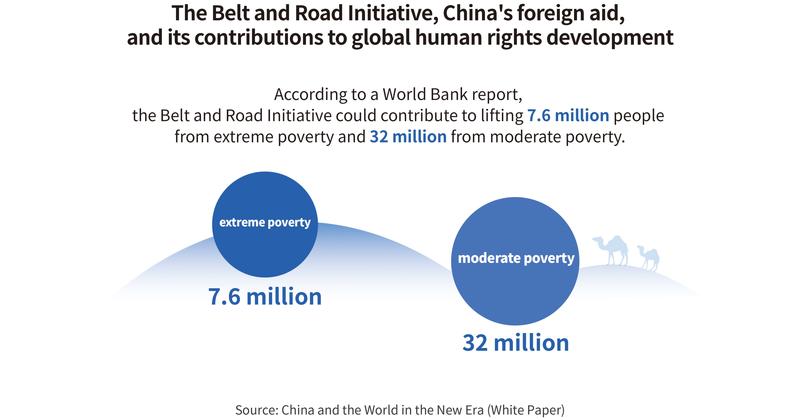
In terms of global poverty relief, China has actively assisted developing countries in seeking ways to shake off poverty and achieve development. Among these efforts, the Juncao technology project, which uses grass instead of wood to cultivate edible fungi, is an exemplary model in South-South cooperation. Over two decades ago, China launched the Juncao assistance project in Papua New Guinea. So far, the technology has taken root in more than 100 countries. In Kigali, capital of Rwanda, Emmanuel Ahimana learned to apply Juncao technology to grow mushrooms and has now been handsomely rewarded.
In the meantime, China also actively shares its experience in poverty alleviation with the world. In September 2020, Huishui County, southwest China's Guizhou Province, hosted a livestream discussion with over 200 politicians from 16 Latin American countries, and shared its experience of how local farmers had shaken off poverty by growing chayote.
The vision of "a community of shared future for mankind" put forward by China has been written into the resolutions of the UN General Assembly, the UN Security Council and the UN Human Rights Council on multiple occasions. A series of propositions put forth by China, including the concept of "promoting human rights through development," have been introduced into the sphere of international human rights. China also facilitated the formulation of a number of important documents on human rights, such as the Convention on the Rights of Persons with Disabilities (CRPD). The country has continuously offered the world Chinese wisdom and solutions to promote the global cause of human rights.
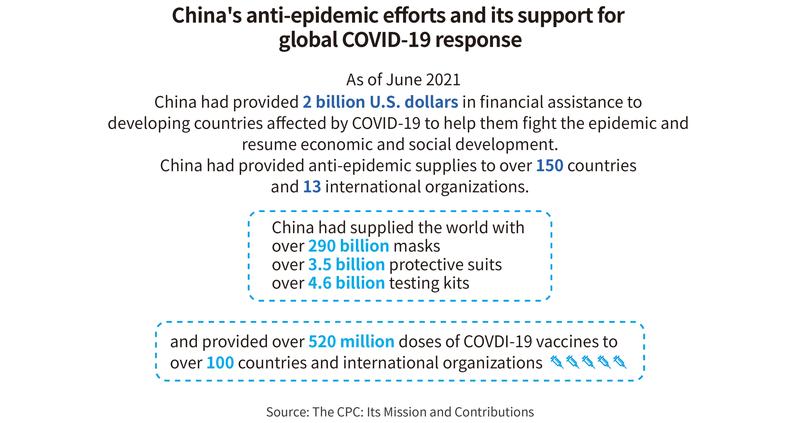
Chapter II
The Rationale: Living a Life of Contentment is the Ultimate Human Right
"Living a life of contentment is the ultimate human right." — This is the essence of China's rationale for human rights development. The people-centered concept of human rights defines the value China pursues in its human rights cause, and shows that putting emphasis on the people is the distinguishing feature of the Chinese path of human rights protection.
This concept includes four dimensions. In terms of the subject of human rights, it makes clear that the people are participants, promoters and ultimate beneficiaries of the cause of human rights. Human rights are not privileges enjoyed by a certain group or by just a few people, but inclusive rights enjoyed by the broad masses of the people; In terms of the connotation of human rights, the direction and focus of human rights development are set in line with the needs of the people. Human rights are expanded from the rights to subsistence and development to other aspects, and the people's aspiration for a better life is the goal of the human rights cause; In terms of human rights protection, whole-process people's democracy is implemented, which gives full play to the enthusiasm, initiative and creativity of the people, so that the people are relied on to drive the progress and development of human rights; In terms of the pursuit of values, the well-rounded development of the individual is taken as the supreme goal of human rights and living a life of contentment is regarded as the ultimate human right. The people's interests are constantly safeguarded and their sense of gain, happiness and security continuously enhanced.
2.1 The core philosophy, the principle of democracy, and the focus on people's livelihoods
The core philosophy — to remain committed to being people-centered. China's human rights cause takes safeguarding fundamental interests of the people as its starting point and ultimate goal. It is committed to serving, relying on, benefiting and protecting the people. Putting people first, upholding the principal position of the people, and putting the interests of the people above all else are the fundamental features of China's human rights development.
The principle of democracy — to remain committed to people being masters of their own country. Democratic rights are the basic human rights. In accordance with China's Constitution and laws, the people manage state and social affairs, economic and cultural undertakings and become masters of the country, society and their own destiny through the system of people's congresses, the system of CPC-led multiparty cooperation and political consultation, the system of regional ethnic autonomy and the system of community-level self-governance. This is the core essence of Chinese-style democracy.
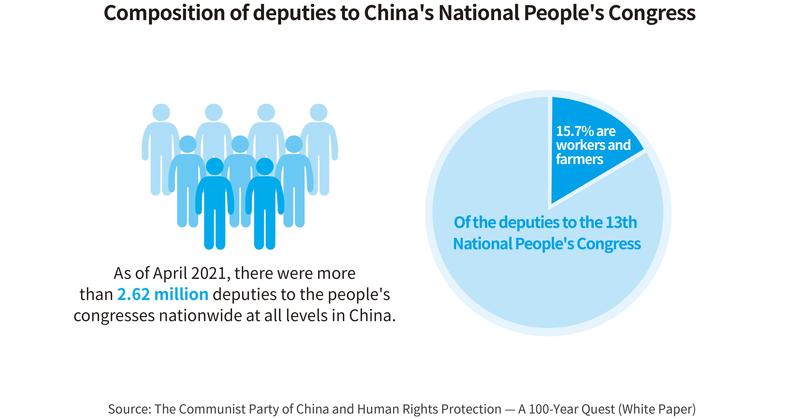
The focus on people's livelihoods — to remain committed to people's wellbeing as the foundation of human rights development. To make sure that people live a good life, and enjoy better education, more stable employment, more satisfactory incomes, more reliable social security, higher-level medical and health services, more comfortable housing, a more beautiful environment and a richer cultural and spiritual life, make everyone free from fear and threat, and let everyone better develop themselves and live a happy life, these are the essence of people fully enjoying more human rights, giving new meaning to progress in human rights.
2.2 The theoretical rationale
From an epistemological point of view, human rights are historical, concrete and realistic. Human rights are the product of certain economic, social and historical conditions, and they develop with the changes of historical conditions. In this sense, the content and level of human rights protection are constantly enriched and improved. There is no end to improving human rights. There is no fixed model of human rights protection in the world. Different countries have different national conditions, histories, cultures, social systems and economic and social development levels. A proper path of human rights development should be explored to suit national conditions and the needs of the people.
From a practical point of view, human rights are promoted through development. Subsistence is the foundation for enjoying all human rights, and development is a must to guarantee subsistence and a foundation for the fulfillment of all other rights. Poverty is the greatest obstacle to human rights, and it must be shaken off through promoting economic development and social progress, so that common prosperity and well-rounded development are gradually achieved. This is China's key approach to advancing human rights protection.
From a dialectical point of view, human rights are the integration of individual and collective rights. There is no collective progress without individual development, while individuals can only enjoy well-rounded development in a collective context. Individual and collective human rights must be integrated and progress side by side, in order to achieve optimal development of human rights.
2.3 The objective, law-based governance, and the evaluation criteria
The objective — promoting the free and well-rounded development of individuals. It is the common pursuit of humanity to realize human rights for all. All people should enjoy full, comprehensive and high-level human rights, so that the free and all-round development of every individual can be ultimately realized, and everyone can fulfill self-development themselves and contribute to the society with dignity.
The roadmap marked by rule of law — upholding social fairness and justice. The principle of equity and justice is the eternal theme of the development of human society. Through improving the socialist institutional frameworks with Chinese characteristics and steadfastly advancing law-based governance, China has integrated the practice of respecting and protecting human rights into the whole process of legislation, law enforcement, administration of justice, and observance of the law, to ensure equal rights, equal opportunities and fair rules for all.
The evaluation criteria — people's sense of gain, of happiness, and of security. Human rights are not an ornament to be used for decoration. The people are the creators of history, and the builders and the fundamental force to rely on in the human rights cause. A country's human rights are essentially gauged by its own people. Whether the people's interests are safeguarded and whether their sense of gain, happiness and security is enhanced are important criteria for evaluating a country's human rights situation.
2.4 Global vision
In the wake of economic globalization and international challenges such as climate change and transnational infectious diseases, the Cold War mentality as well as the hegemonic practices of putting one's own country's interests above the interests of others and even the international community at large, and pointing fingers at other countries are not welcome. The democratization of international relations and the reinforcement of interdependence of the international community is an objective trend. [Liu Huawen, "Understanding the Communist Party of China's view of human rights," the Global Times, July 29, 2022]
The Chinese nation has always held these beliefs dear: "All people under the heaven are of one family" "All the people are my brothers and I share the life of all creatures" and "All nations should live in harmony." China's outlook on human rights has deep cultural roots, advocating that "a just cause should be pursued for the common good," which not only guarantees the human rights of the Chinese people, but also strives to pass down the spirit of benevolence and pursue one's own development as well as development for all. The Chinese people are ready to work with people all over the world to uphold the common values of peace, development, fairness, justice, democracy and freedom for all mankind, and to safeguard human dignity and rights.
On the path of human rights development, China is committed to replacing estrangement between civilizations with exchanges, clashes with mutual learning, and superiority with co-existence. China advocates dialogue and cooperation based on equality and mutual respect, and seeks to promote progress through cooperation and to ensure human rights with benefits deriving from development, so as to promote the healthy development of the global human rights cause.
China firmly upholds the international system with the United Nations (UN) at its core and the international order based on international law, vigorously conducts South-South cooperation under the framework of multilateralism, and works toward the formation of a fairer, more equitable, reasonable and inclusive global human rights governance system. The notion of building a human community with a shared future has been written into many UN documents. The ideas including jointly building the Belt and Road and jointly building a global community of health for all as well as a community of life for man and Nature, and the initiatives including the Global Development Initiative and the Global Security Initiative, have all contributed to the cause of global human rights development, and have greatly enriched and developed the concept of human rights.
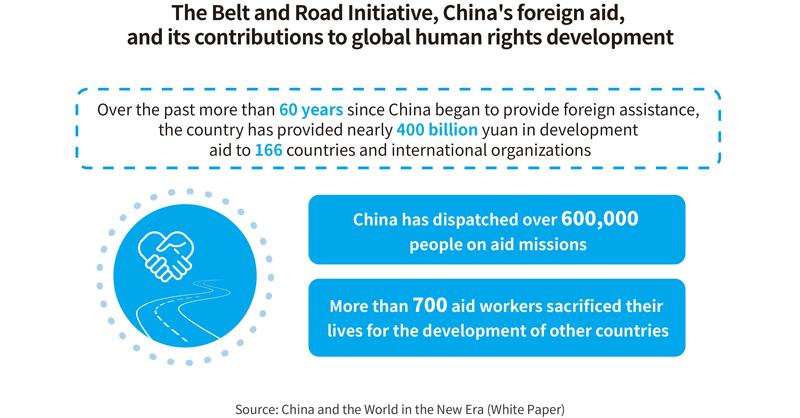
Chapter III
Exploring New Dimensions in Respecting, Protecting Human Rights
China is the largest developing country in the world and a vast country with an ancient history. Its novel ideas, measures and practices in terms of how to respect and protect human rights are a refreshing addition to the global human rights cause and to the diversity of civilizations. They may also offer inspiration for the rest of the world, especially for developing countries. By upholding the idea that the rights to subsistence and development should be taken as primary basic human rights, China has met the basic living needs for an extra-large population and finished building a moderately prosperous society in all respects. With a combined population of more than 80 percent of the world's total, developing countries are faced with similar tasks. In this sense, China's explorations and experiences are of great value for their reference.
American scholar Philip Lee Ralph wrote in the preface of World Civilizations that most of human progress thus far has resulted from the growth of intelligence and respect for the rights of man, and that therein lies the chief hope for a better world in the future. China is ready to share its experiences with the rest of the world, engage in joint explorations, and contribute Chinese wisdom and proposals to the global initiatives to advance human rights and build a better world.
— Determined leadership. When commenting on the incredible achievements that China has made in various fields over the past few decades, foreign observers are often impressed by its leadership, which is a distinctive feature of the country's experience in governance. This is best manifested in the top-level design that allows for blueprints to be translated into reality, the perseverance to hammer away until a job is done, and strong mobilization capabilities.
For developing countries, a strong leadership is of vital importance to their many endeavors ranging from national independence and liberation to economic growth and improvement of people's livelihood.
Taking as its original aspiration and mission the pursuit of happiness for the Chinese people and rejuvenation for the Chinese nation, the CPC has successfully united and organized the Chinese people in building China into a modern country, and made the people masters of the country, of the society and of their very own fate. During the past decades, the Party has been working hard to advance the modernization of the country, while ensuring people's well-being and raising their living standards. As China's fight against poverty entered its decisive stage between 2012 and 2020, President Xi Jinping personally planned and commanded the battle at the forefront, having visited 14 contiguous areas of dire poverty. Throughout the country, 255,000 resident working teams and more than 3 million first Party secretaries and officials stationed in poor villages fought poverty on the front line alongside nearly 2 million township officials and millions more cadres dispatched to villages. At a result, it only took China eight years to lift 100 million rural dwellers out of poverty, creating a miracle in the history of human rights.
The strong leadership of the CPC has provided clear strategic guidance for China's human rights cause, fostered efficient synergy capabilities, and unleashed the enthusiasm, initiative, and creativity of the people in a continuous manner. China has turned the abstract concept of human rights into a set of tangible rights and interests that the people could enjoy on the ground, such as the rights to subsistence, development, life and health. This has made human rights more concrete and appreciable, marking a major advancement of the human rights cause.
— Down-to-earth approach. For children living in war-torn regions, human rights are first and foremost defined as personal safety and being able to leave the refugee camps and return to their peaceful homes and classrooms. For women in underdeveloped countries, human rights might mean a water well near their doorsteps and sufficient, clean drinking water. For families mired in energy crises, human rights may refer to access to affordable modern energy that would allow them to have dinner in bright lamplight. For many racial minorities in the United States, human rights might come first and foremost as being free from systemic discrimination in life and at work and receiving equitable opportunities for personal and family development.
There are no two identical leaves in the world. Likewise, there is no single fixed model for the development of the human rights cause. China's experience suggests that a path that is based on the realities of the country itself and befits its own conditions is the only one that can work well, and win the support of its people. Countries vary significantly in national conditions, thus they ought to choose paths that conform to their circumstances and befit themselves. Paths imposed by others usually lead to nowhere, whereas blind imitation often backfires.
— Development-oriented. Human rights protection would not be possible without certain material prerequisites. Development is the pathway to people's well-being, and the driver for the advancement of the human rights cause. The Chinese government has always prioritized development, and kept expanding the economic pie to ensure a solid material foundation for human rights protection. To meet people's aspirations for a quality life, the government has pursued a development path that is of higher-quality, more efficient, equitable, sustainable and secure to keep up with the people's ever-growing needs for multifaceted rights, and facilitate all-round progress of each human right.
After securing the historic success of eradicating absolute poverty, which is considered the biggest obstacle to human rights, China has set its eyes on the undertaking of common prosperity, working to distribute the benefits of development among the people in a fairer way and provide them with a more robust, solid, and sustainable sense of gain, happiness, and security.
The world today is undergoing profound changes unseen in a century. The global human rights cause faces grave challenges. Against such a backdrop, development carries much more salient relevance. The Global Development Initiative that China has proposed aims to facilitate the implementation of the UN 2030 Agenda for Sustainable Development, so as to achieve more robust, greener and more balanced global development, and, in turn, better protect and enhance human rights.
— Legal guidance. Rule of law is an important political achievement of mankind, a basic way of modern governance, and an effective instrument to protect human rights. When advancing its human rights cause, China attaches great importance to strengthening of legal protection. China's Constitution serves as a fundamental document for safeguarding human rights, and sets basic terms in this regard. It not only establishes that the state shall respect and protect human rights, but also makes comprehensive and systematic stipulations to ensure that all citizens enjoy personal rights, the right to dignity, property rights, political rights, and economic, social and cultural rights. China has implemented a strategy to comprehensively advance the rule of law. It strives to build a system of socialist rule of law with Chinese characteristics to pursue coordinated progress in law-based governance, law-based exercise of state power and law-based government administration, and promote integrated development of the country, the government, and society based on the rule of law, so that the citizens' rights and interests are firmly ensured.
— Open-Mindedness. The modern concept, thinking and practices of human rights were born during the Enlightenment in Europe. Hundreds of years on, respecting and protecting human rights have become a fundamental principle of modern civilization and a great hallmark of the advancement of civilization. As the Universal Declaration of Human Rights has been translated into hundreds of languages and spread across the globe, human rights, a common undertaking shared by mankind, have been developed along diverse pathways in the world.
Given the differences in history, culture, social systems, and economic and social development, people from different countries of the world have different understandings of human rights and pursue different paths to seek human rights progress. China respects the diversity in the approaches to human rights development and holds that there is no such thing as a perfect "Utopia" for human rights. It opposes double standards in human rights, rejects attempts to politicize and weaponize human rights, and objects to interventions in others' internal affairs in the name of human rights. China advocates enhanced exchanges and mutual learning between civilizations, addressing the "governance deficit" of human rights, promoting fairer, more equitable, reasonable and inclusive global governance of human rights, and working together to build a human community with a shared future.
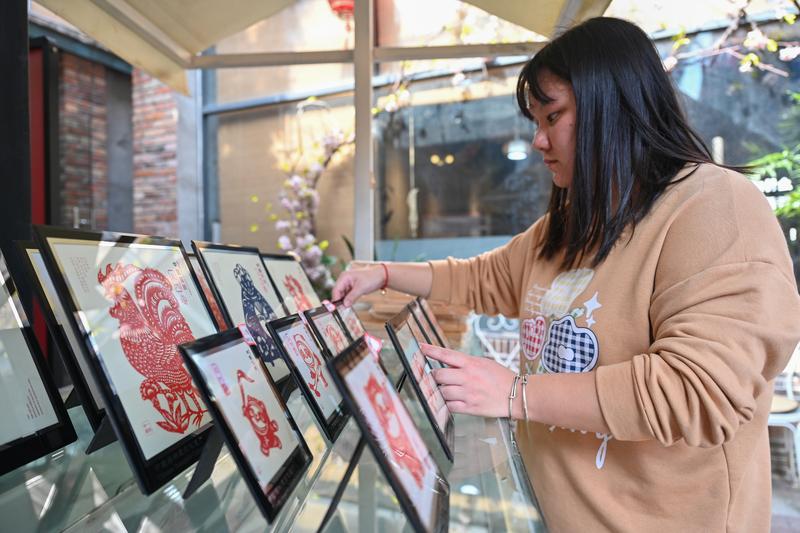 A woman displays paper-cuttings in front of a charity art gallery on Saturday in Quanzhou, Fujian province. The gallery provides job opportunities for special education students before they enter the workforce. (ZHOU YI / XINHUA)
A woman displays paper-cuttings in front of a charity art gallery on Saturday in Quanzhou, Fujian province. The gallery provides job opportunities for special education students before they enter the workforce. (ZHOU YI / XINHUA)
Conclusion
The quest to improve human rights never ends.
After decades of strenuous efforts, China has successfully blazed a human rights development path that conforms to the times and befits its own national conditions. As the largest developing country in the world, China will remain in the primary stage of socialism for a long time to come. There remains significant room for progress in its human rights cause. Now that the country has fulfilled its first centenary goal, China has embarked on a new journey to build itself into a modern socialist country in all respects.
Standing at a new starting point in its development endeavors, China conforms to the people's aspirations for a better life and attaches even greater importance to respecting and protecting human rights. It is promoting coordinated progress in the economic, political, cultural, social and eco-environmental fields to meet the people's ever-growing need for multifaceted rights and beef up human rights protection in an all-round way.
In today's world, poverty, wars and environmental problems, among others, have posed grave threats to human rights protection. The world is faced with prominent "governance deficit" in terms of human rights. To address these challenges, countries need solidarity instead of confrontation, cooperation instead of disengagement, openness instead of blockade, and communication instead of sanctions.
It is the common aspiration of human society that every one should enjoy human rights in the full sense of the term. To this end, countries should base their efforts on equality and mutual respect, actively engage in human rights dialogues and cooperation, expand consensus while bridging differences, learn from each other and pursue common progress, so as to make global governance of human rights fairer, more equitable, reasonable and inclusive, and deliver real benefits to people of all countries.


